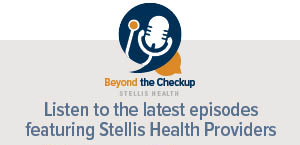Back-to-school time is right around the corner and between the trips for new clothes and school supplies, it’s also critically important to schedule a wellness checkup for your child. And while the kids are the focus of the appointment, you as the parent have some assignments too. Think back to skills and subjects from your own school days and do the necessary homework in preparation for your child’s checkup.
Appointment 101
It is recommended that kids receive an annual checkup with their pediatrician or regular healthcare provider, from ages three to 18. Once they are considered of school age, the visit is often called a school physical, and can also include a sports physical.
This routine exam is based on the guidelines from the American Academy of Pediatrics and assists providers with assessing a child’s physical, mental, behavioral, and intellectual growth, while also determining if they are meeting the necessary developmental milestones.
Starting these appointments at a young age allows physicians to catch any problems early and immediately begin the best treatment. It also sets kids on a path of learning about healthy habits that they can use throughout their lives.
Tests and screenings, at varying ages:
- Hearing and vision
- Height and weight
- Visual body review: eyes, ears, mouth, throat, nose, teeth, limbs, neck, hands, feet, and skin
- Blood pressure and pulse
- Lymph nodes, heart, lungs, and abdomen
- Screens for scoliosis, hernia, and overall level of physical maturity
- Blood tests for cell counts, cholesterol levels, diabetes, and lead poisoning
- Joints, strength, posture, reflexes, and flexibility
- Fine-motor development (such as tying shoes) and gross-motor development (such as jumping)
Immunizations (required and recommended, at varying ages):
| Hepatitis B (HBV) | Hepatitis A (HAV) |
| Pneumococcal conjugate (PCV) | Diphtheria, Tetanus, and Pertussis (DTaP) |
| Hemophilus influenzae type b bacteria (Hib) | Inactivated poliovirus (IPV) |
| Measles, Mumps, Rubella (MMR) | Varicella (chickenpox) |
| Neisseria meningitis (MCV) | Rotavirus |
| Human papillomavirus (HPV) | Influenza |
Now, back to parent assignments. Put on your thinking caps and sharpen those pencils . . .
History
Physicians keep a detailed log of your child’s information year after year as they track their health and developments. The more information included in the file, the more it will assist pediatricians with diagnoses, prevention, and a better overall understanding of each unique child. Come prepared with this necessary information right from the start and provide any updates as they arise. Items to note:
- Current medical conditions and illnesses such as allergies, asthma, and diabetes
- Past and current medications like prescription medications, over-the-counter medicines , and supplements, include the dosages
- Past illnesses, injuries, surgeries and/or hospitalizations with dates
- Family medical history of serious conditions such as heart disease or cancer
Civics & Geography
Physical exam requirements may vary by state, grade, and type of school; even more so if your child needs an eligibility form to participate in sports. It is important to know all the health guidelines required nationally, state-specifically, and all the way down to the school level. Things to remember:
- Bring school-specific forms such as immunizations and updated records to the appointment for physician sign-off
- Review school policies about tests and/or vaccines need to be noted in school records
- Sports physicals are typically required for children in middle school through college and need physician-signed eligibility forms stating your child is healthy enough and/or meets the criteria for sports participation
- Camp physicals, similar to a sports physical, evaluates a child’s overall health and their ability to participate in certain activities
Research
There will be a Question & Answer portion to the exam as well. Prepare a list of questions and concerns in advance that you would like to address with your child’s pediatrician. Your provider might also have a list of questions for you and your child. You may be called upon to clarify younger children’s responses. Some questions may be more specific for you.
Your pediatrician may inquire about these topics:
- Have there been any changes at home that may affect your child and their behavior
- Questions to evaluate self-esteem
- Asking about grades and schoolwork
- How your child copes with anger and disappointment
- A description of sleep habits
- Daily nutrition and diet choices
These subjects and observations might warrant questions for your physician…ask yourself:
- Have I noticed changes in my child’s daily habits?
- Does my child seem more anxious, depressed, or irritated? Other strong developing moods?
- Has there been an uptick in complaints of pain, dizziness, digestive issues, or other physical ailments?
- Am I seeing learning difficulties or falling behind in some way?
- Have I observed escalated behavioral issues such as distraction or disruptions?
- Is my child on track with important developmental milestones?
- What is worrying me about my child?
Please keep in mind that if you have a serious concern, a separate visit with your provider should be scheduled – don’t wait until your wellness check.
Communications
Clear, age-appropriate discussion is key for all parties involved – children, parents, and providers. Helping your child to understand what will take place during the appointment will help ease little minds. Physicians may present age-specific health and safety topics for discussion that require parents to have additional follow-up conversations with their children. Simple, straightforward communication will translate into important learning opportunities.
- While primarily a conversation for younger children, never underestimate the anxiety a doctor’s appointment can instigate. Put any age kid at ease with an honest walk-through of what they can expect at their exam and provide support and comfort when discussing any fears.
- Safety behaviors may be brought up by physicians and require reiteration and backing from parents in real world situations. Be prepared to have discussions with your child about germs and how they spread, the importance of handwashing, wearing a seatbelt in the car, wearing a helmet while riding a bike, and concerns about alcohol, drugs, cigarettes, and sexual activity.
- Student athletes require an additional set of age- and sport-specific discussions. Providers and parents should talk with their sports stars about healthy eating, concussions/head injuries, appropriate gear, heart health, safe exercise practices, preventing injuries, managing sports training, and the dangers of overtraining.






